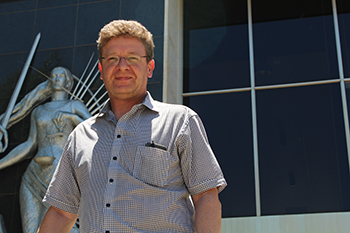Latest News Archive
Please select Category, Year, and then Month to display items
25 March 2024
|
Story Anthony Mthembu
|
Photo Lutendo Mabata
 Prof Nompumelelo Zondi, the newly appointed Vice-Dean: Research and Postgraduate Studies in the Faculty of The Humanities at the University of the Free State (UFS).
Prof Nompumelelo Zondi, the newly appointed Vice-Dean: Research and Postgraduate Studies in the Faculty of The Humanities at the University of the Free State (UFS).
Prof Nompumelelo Zondi has been appointed as Vice-Dean: Research and Postgraduate Studies in the Faculty of The Humanities at the University of the Free State (UFS). Prof Zondi assumed this new role on 1 March 2024 after serving as the Head of Department for African Languages at the University of Pretoria for seven years. “I consider this appointment as an opportunity of growth and learning more about higher education and the Faculty of The Humanities at large,” she said.
Prof Zondi indicates that part of her role is to spearhead the UFS Vision130 within the Faculty of The Humanities, and to ensure that the faculty assists the institution in becoming research-led, student-centred, and globally impactful.
Motivation for assuming this role
One of the primary reasons that led her to consider this role is sharing the knowledge she acquired as part of the Fulbright South African Research Scholar Programme. As a result of that experience and exposure, which went beyond the Ohio State University, she felt it befitting to implement some of the insights she acquired on a bigger scale. Therefore, even though she was impactful in her previous role, Prof Zondi believes that this is an exceptional and more desirable platform to do so. “I feel that I will have easier access to departments within the faculty, while also encouraging and supporting interdepartmental and faculty collaborations,” she explained.
A significant component of Vision 130
He believes that the elements that make up Vision 130 are interrelated. While she considers research central to Vision 130 – as she begins her journey at the UFS, she feels students deserve to be nurtured to further contribute to the university’s impactful research. Thus, student-centredness is the way to go. “I believe that students must be major role players in this Vision130; we must include them in the interactions and discussions that are part of the university’s strategic plan as well as in decision-making processes,” she said. As such, according to Prof Zondi, the more the faculty and the institution care for the students and involve them in Vision130 and in collaborations, the more research outputs the university will achieve.
Freedom of religion, a constitutional right and area of global concern
2017-01-17

Prof Shaun de Freitas
Photo: Mamosa Makaya
Freedom of religion is enshrined in the South African Constitution, states that everyone has the right to freedom of religion, which more specifically entails the freedom of conscience, religion, thought, belief and opinion. It makes provision for the protection of religious communities in South Africa. Consequently, the maintenance and protection of such a right is of fundamental importance.
Prof Shaun de Freitas, Associate Professor of Law at the University of the Free State (UFS) specialises in constitutional law, with a specific focus on the right to freedom of religion, and has produced several publications in the field. The latest is titled “Transcending the Private-Public School Divide in the Context of the Right to Freedom of Religion in South Africa”, Chapter 19, in Religious Freedom and Religious Pluralism in Africa – Prospects and Limitations published by Stellenbosch University in 2016.
Prejudice a challenge in all societies
There are numerous challenges faced by religious groups around the world concerning prejudice, association with terrorism and political power and influence. Therefore, research in this field becomes important in helping to uphold the rights and freedoms of religious minority groups, to be able to foster understanding between communities.
Balancing responsibility and religious rights
His current focus is on challenges that have arisen in South Africa, more specifically pertaining to the right of medical practitioners to object conscientiously towards participating in certain medical procedures, the parameters of freedom related to religious associations and the inclusion of religious expression in public schools. These matters are also relevant to many other parts of the world (including, ironically enough, those democratic societies that endeavour to make diversity flourish).